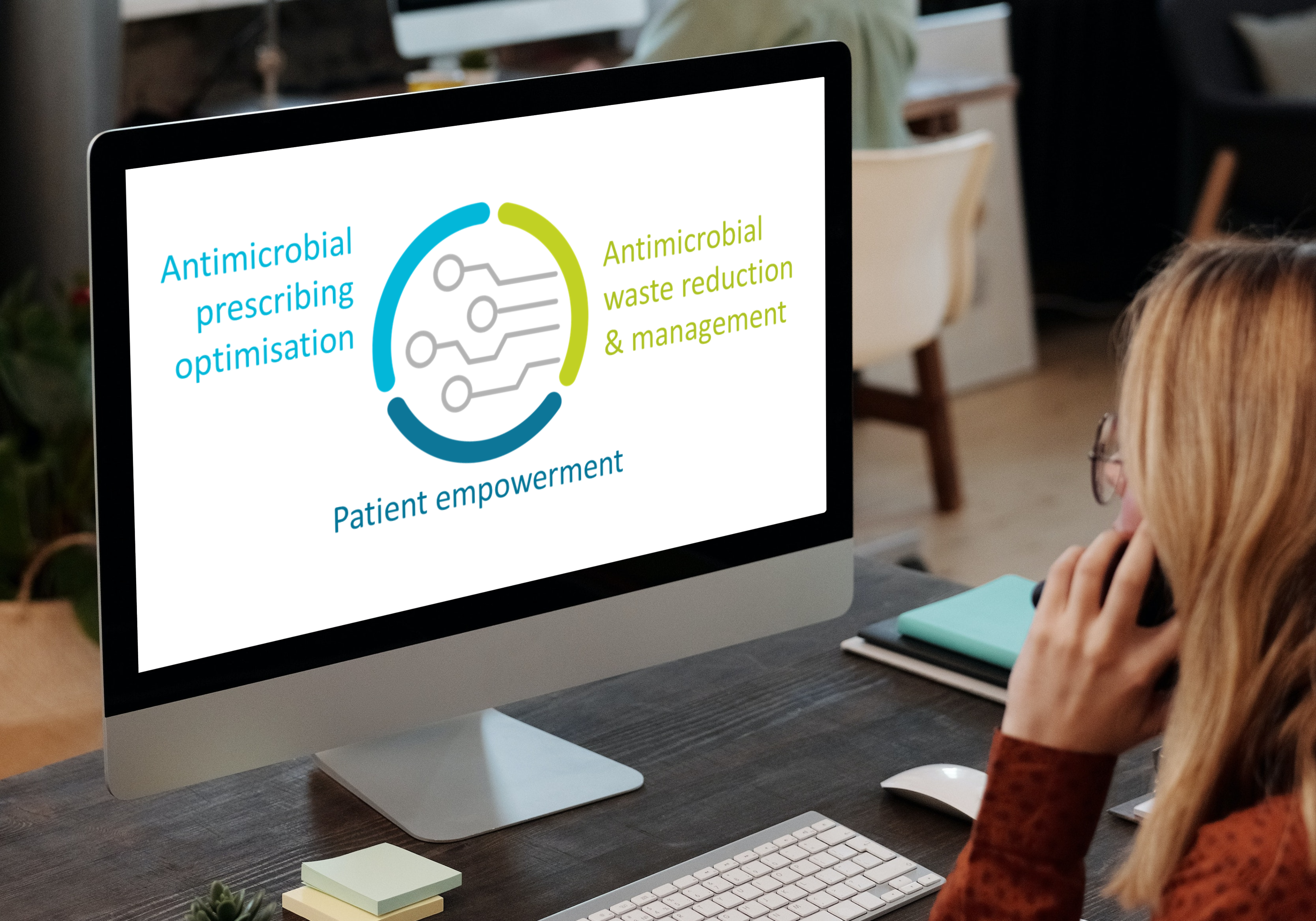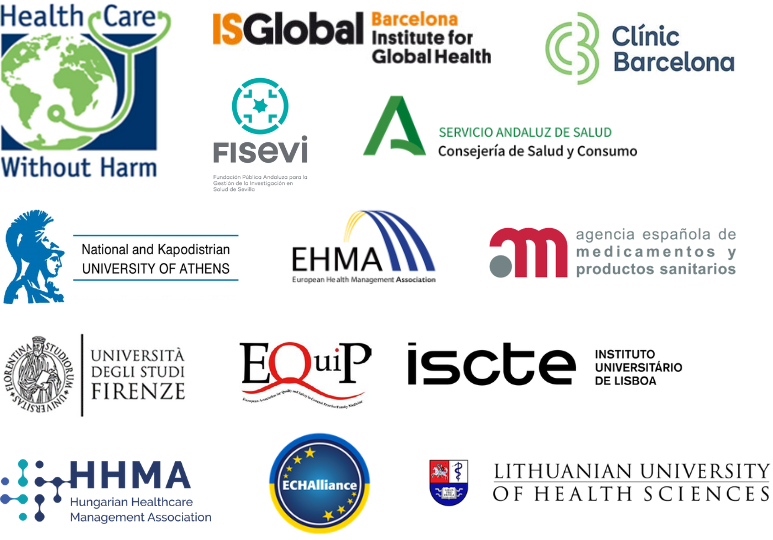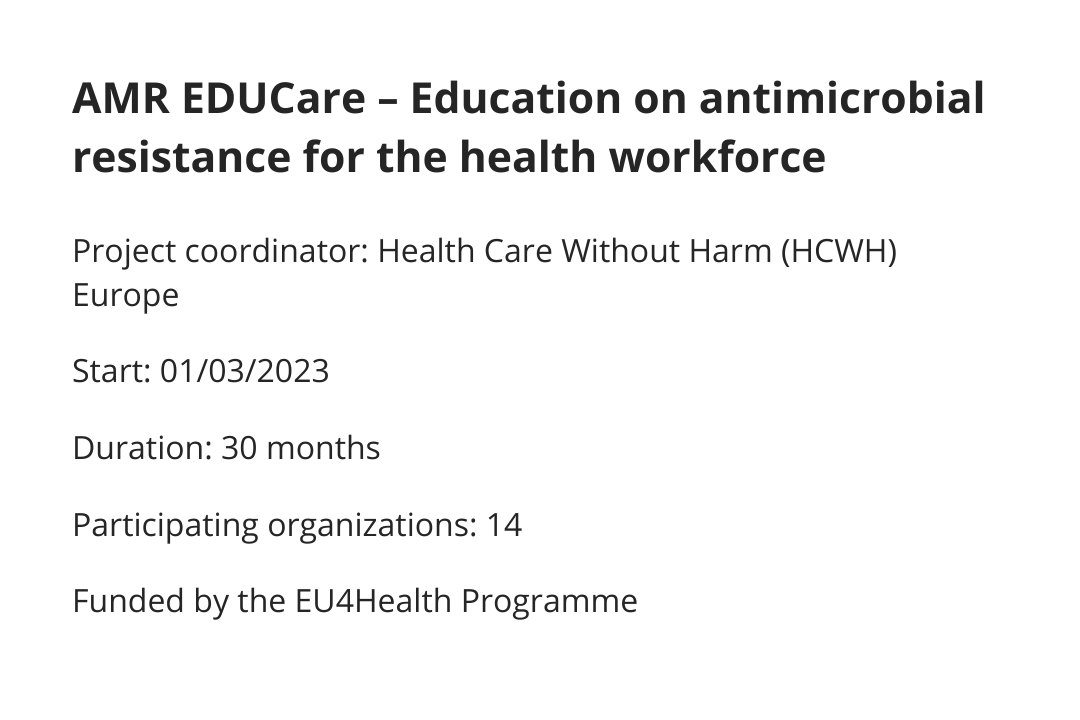Our project aims to transform the healthcare industry by equipping clinical and non-clinical staff with the knowledge, skills, and competencies needed to tackle antimicrobial resistance (AMR) head-on.
Through our three courses, we will optimize antimicrobial prescribing, reduce waste, and empower patients through effective communication.
Our practical teaching methodology combines clinical and technical topics with soft skills, such as patient communication, digital skills, and behaviour change interventions.
By providing accessible, self-paced e-learning courses, that will also serve as the basis of national-level CPD and microcredit earning courses, we aim to ensure the long-term use and sustainability of our training modules.
Follow us in our mission to achieve prudent antimicrobial use, improve patient outcomes, and contribute to the fight against AMR.

Impact and ambition
Project effects
Short-term
- The project’s immediate effects will be to train health professionals on methods, tools and skills to prevent the spread of AMR.
- 2,500 doctors trained (with a minimum of 500 in Spain, 100 in Portugal, 550 in Italy, 250 in Greece, 250 in Hungary, 250 in Lithuania)
- 860 pharmacists trained (with a minimum of 200 in Spain, 40 in Portugal, 220 in Italy, 100 in Greece, 100 in Lithuania)
- 2,900 nurses trained (with a minimum of 200 in Spain, 40 in Portugal, 220 in Italy, 250 in Greece, 500 in Hungary, 250 in Lithuania)
- 560 health management professionals trained (with a minimum of 100 in Spain, 20 in Portugal, 110 in Italy, 50 in Greece, 100 in Hungary, 50 in Lithuania)
- 36 trainers trained (with a minimum of 6 in Spain, 3 in Portugal, 3 in Italy, 3 in Greece, 3 in Hungary, 3 in Lithuania)
Medium-term
The project will contribute to changing the behaviours and professional practice of the health workforce for more prudent use and handling of antimicrobials covering different areas: prescription, waste management and communication.
- At least 20% of prescribers reporting changes in their prescription habits towards more responsible prescription
- At least 20% of health management professionals reporting changes in their approach to waste management for a reduced antimicrobial footprint
- An increase by 20% of medical doctors, nurses and pharmacists who provide advice on prudent antibiotic use to patients
Long-term
The project is expected to deliver long-term effects, some of which will be measurable after the end of the project period.
- A reduction of 10% in the volumes of antimicrobials prescribed by medical doctors undertaking the training
- An overall 10% increase in positive attitudes towards antibiotics and prescription among patients (decrease in the insistence to be prescribed an antibiotic without a rationale, increase of correct disposal of antibiotics by returning leftover and expired antibiotics at the pharmacy)
Target groups
Medical doctors (prescribers)
Medical doctors are one of the main target groups of this project. Through the training programme medical doctors, particularly from primary care settings, will improve their clinical knowledge on antibiotic prescription as well as their understanding of their conscious and unconscious behaviours with regards to prescribing. Furthermore, they will be equipped with the necessary communication skills to talk to patients about prudent antibiotic use to change patient behaviours and increase patient empowerment with regards to treatment and recovery. This will in turn result in fewer antibiotic prescriptions and more responsible use of antibiotics on behalf of patients.
Pharmacists
The training programme will equip pharmacists (especially community pharmacists) with effective communication skills to talk to patients about correct antibiotic use and disposal. Pharmacists will feel more confident and empowered to talk to patients about responsible and correct antibiotic use (i.e. the importance of completing the full cycle of antibiotic treatments) and disposal (i.e. the need to follow appropriate medication disposal schemes for unused or expired antibiotics), resulting in more prudent antibiotic use and a reduction in incorrect antibiotic waste disposal among the general population.
Health management professionals
Health management professionals, including medical directors, clinical managers, nursing home administrators, laboratory managers, heads of clinical procurement, will improve their knowledge and skills on antimicrobial waste reduction, and greener waste management practices. Health management professionals will adapt procurement and waste management processes and practices for a reduced AMR environmental footprint.
Nurses
While nurses are not the main target group of the training programme, a number of modules are relevant to the nursing profession. This is the case of modules focusing on digital health, behaviour change, communication, overview of current antibiotic treatments, general information on AMR, and patient empowerment. Nurses will increase their knowledge and skills on responsible and correct infection prevention and control measures and will learn communication skills for improved patient interaction.
Through the training, nurses will recognise their important role in reducing the spread of AMR through the adoption of correct infection prevention and control measures. They will also play an increasingly important role in advising patients on the correct use of antibiotics.
Change and innovation
Change
The project aims to trigger change in the scope and target audiences of Continuous Professional Development (CPD) courses in the area of AMR prevention.
The training for clinical staff on AMR prevention focuses heavily on behaviour change and patient communication and interaction. These are two aspects which have often been overlooked in previous training programmes on the issue. Through this project we seek to influence the CPD training landscape to include these elements in AMR prevention training courses. As outlined in WP8 Sustainability, we will also concretely support the mainstreaming of the educational content developed through this project in academic partners’ current educational offering with a view to updating them. Academic partners, and members of the Advisory Board, will endeavour to use materials and resources developed through this project in other relevant courses offered by their institutions. Through advocacy actions targeted at national healthcare professional associations, we will also seek to influence the training programmes and training guidelines developed by these organisations with the aim of mainstreaming key elements of AMR prevention outlined in this proposal.
Innovation
This proposal seeks to equip the health workforce with digital health skills to tackle the spread of AMR.
This will include knowledge about available digital tools that may support health workers in preventing and reducing the spread of AMR, such as: telehealth consultations, online tools for stock management and logistics, remote audits and digital communication tools for patient engagement and interaction. In addition, experiential learning of digital health tools will be leveraged as a means to achieve behavioural change. The training programme will also adopt innovative approaches, such as the use of role model training with patients to train clinical staff on communication techniques and on how best to manage patient expectations and needs.


Subscribe to our newsletter to stay informed about course development and availability

Funded by the European Union. Views and opinions expressed are however those of the author(s) only and do not necessarily reflect those of the European Union or the Health and Digital Executive Agency (HaDEA). Neither the European Union nor the granting authority can be held responsible for them.


